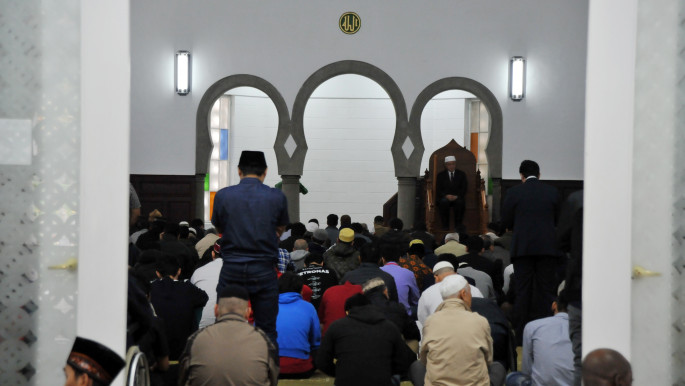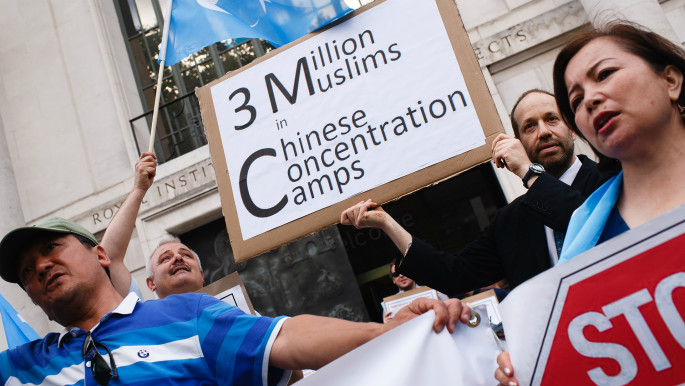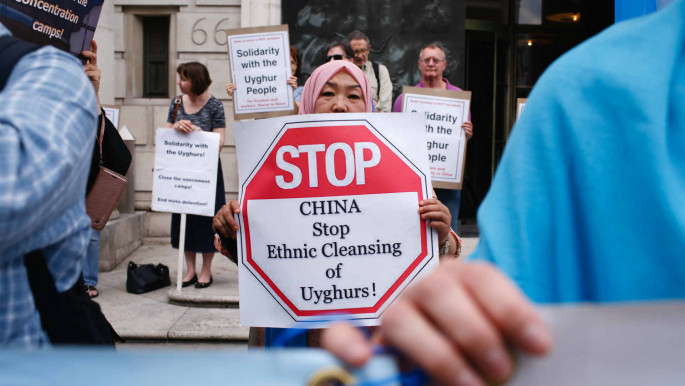'Taiwan welcomes all Muslims': What China can learn from its neighbour about treatment of minorities
While China has courted controversy by confining its Muslim minority groups to concentration camps and all but outlawing Islam itself, Taiwan has chosen another path.
The island country has made a point of embracing its Muslim minority, improving its ties to Muslim-majority countries, and welcoming Muslim immigrants as part of a wider bid to distance itself from China's authoritarian reputation.
Taiwan is even attempting to attract Muslim tourists, an atypical but effective initiative to demonstrate that, unlike China, the island country sees Islam as a component of its cultural heritage and foreign policy.
China considers Taiwan a Chinese province, a claim that most of the international community has respected. Even so, the island country has acted as a sovereign state in all but name since 1949, managing its own domestic and foreign policies.
To combat Chinese-enforced international isolation, Taiwan has led drives such as the New Southbound Policy, Taiwanese President Tsai Ing-wen's effort to expand contacts with allies in Asia, including the Muslim-majority countries of Brunei, Indonesia, and Pakistan.
"Because of the New Southbound Policy and a high level of involvement from the government, Taiwan has strived to create a Muslim-friendly environment," said Zaharah Chen, an assistant at the Chinese Muslim Association (CMA), a Taiwanese cultural institution that administers the Taipei Grand Mosque.
 |
Unlike China, the island country sees Islam as a component of its cultural heritage and foreign policy |  |
"Taiwan welcomes all Muslim visitors and good relationships with other countries."
In a 2017 meeting with Taiwanese Muslims returning from the Hajj in Mecca, Tsai described the CMA as an important contributor to the New Southbound Policy and expressed hopes that Taiwan would continue its pro-Muslim trajectory. About 60,000 Muslims live in Taiwan.
 |
|
| About 60,000 Muslims live in Taiwan [Getty] |
"Taiwan is a democratic country whereas China is a communist country," Chen told The New Arab. "That's why they have completely different policies toward Muslim minorities."
Japan, Turkey, and many Western countries have condemned China's ongoing persecution of the Uighurs, a Muslim ethnic group in the Chinese region of Xinjiang.
Nonetheless, many Muslim-majority countries that benefit from trade with China, among them regional powers Pakistan, Qatar, Saudi Arabia, and the United Arab Emirates, have come to the East Asian country's defence.
 |
|
| Read also: Why Muslim countries are turning their back on China's repressed Uighurs |
For its part, Taiwan often voices its support for Uighurs and other social groups targeted by China, protesters in Hong Kong serving as the latest example. In the Muslim world, Taiwan wants to outcompete its much larger neighbour.
"The CMA has worked on forging relationships with Muslim-majority countries for a very long time," noted Chen. "By expanding on the connections that the CMA has built, it has become easy for the Taiwanese government to promote friendly ties with the Muslim world."
Taiwan's Muslim-friendly foreign policy has included attracting Muslim tourists. In particular, Taiwanese travel agencies have focused on appealing to Indonesians and other Southeast Asians.
"To attract more Muslim tourists to Taiwan, and to increase the visibility of Taiwan in the Muslim world, we have been focused on building up a Muslim-friendly environment here," said a spokesman for the Taiwan Tourism Bureau, a government agency.
"The Bureau has worked with Taiwan's halal certification bodies to issue certificates for restaurants that provide halal food, as well as to hotels and central kitchens. Our aim is to provide various foods and comfortable hotels for Muslim travellers."
 |
Taiwan is a democratic country whereas China is a communist country... That's why they have completely different policies toward Muslim minorities |  |
Taiwanese businesses made $26 billion from tourism in 2017. As China further limits its citizens' ability to travel to Taiwan, imposing its latest restrictions this July, Taiwanese travel agencies have gone out of their way to highlight the island country's appeal as a Muslim-friendly tourist attraction.
"In order to make Muslim travellers feel more at ease in Taiwan, the Bureau has also encouraged public transportation facilities and scenic spots to build prayer rooms and ablution facilities," the spokesman told The New Arab.
"Now, national scenic areas, international airports, and train stations such as Taiwan High Speed Rail's Taichung station as well as Taipei's, Taoyuan's, Kaohsiung's, and Hualien's stations have set up Muslim-friendly facilities, and other places will be gradually added to the list."
 |
|
| Read also: Uighur Muslims abroad are refugees fleeing China's oppression. Don't send them back under any circumstances |
Despite Taiwan's promises to Muslim residents and tourists, Taiwanese scholars emphasise that the island country is still struggling with Islamophobia and opposition to immigration. Some experts even question whether Taiwanese officials have realised their lofty goals of integrating Muslims.
"I would not say that Taiwan is a model for a Muslim-friendly country," said Dr En-Chieh Chao, an associate professor of sociology at National Sun Yat-sen University.
"Just a couple of years ago, we still faced several cases in which Taiwanese employers forced their Indonesian domestic workers to eat pork. Some is due to ignorance of cultural differences, not specifically targeted against Muslims. Foreign Muslim workers are mistreated not because they are Muslims, but because they are viewed as lower-class 'maids.' Taiwanese people usually associate foreigners with Caucasians."
The efforts of Taiwanese activists and leaders to accept Muslims and accommodate their needs have contributed to curbing Islamophobia in Taiwan. Before Tsai, Taiwanese President Ma Ying-jeou and his predecessor, Chen Shui-bian, gave speeches affirming Muslims' place in the island country.
"No one can deny that the problem of ignorance has improved over the recent years," said Chao. "With constant campaigns made by NGO workers and academics and with deeper connections among different populations, the public to some extent is becoming more willing to provide space for Muslims to celebrate their festivals, especially toward the end of Ramadan."
Even if Taiwan must do more to defend minority rights, the island country has succeeded in its bid to distinguish itself from China, where Uighurs enjoy few of the many protections enshrined in the Taiwanese Constitution.
 |
The better Taiwan treats Muslims, the greater the gap between Taiwanese officials and their counterparts in Beijing |  |
In fact, the stories of Chinese authorities forcing Muslims in Xinjiang into concentration camps – in addition to a fiery showdown between pro-democratic protesters and unelected lawmakers in Hong Kong – has added to Taiwan's reluctance to draw closer to China. The better Taiwan treats Muslims, the greater the gap between Taiwanese officials and their counterparts in Beijing.
"After what many Taiwanese have seen in reports about Xinjiang or from those Uihgurs lucky enough to have escaped, they are truly appalled and have become more determined to keep their distance from China," Chao told The New Arab.
"Now, more Taiwanese people care about Muslims to a greater degree – not because they are Muslims, but because they are victims of Beijing, just like we are."
Austin Bodetti studies the intersection of Islam, culture, and politics in Africa and Asia. He has conducted fieldwork in Bosnia, Indonesia, Iraq, Myanmar, Nicaragua, Oman, South Sudan, Thailand, and Uganda. His research has appeared in The Daily Beast, USA Today, Vox, and Wired.



